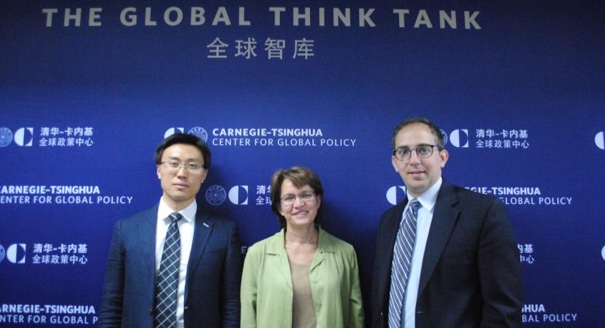Registration
You will receive an email confirming your registration.
The role of nuclear weapons in the U.S.-China relationship is moving to the foreground as tensions rise on the Korean peninsula and in other key areas. President Trump has said he wants to strengthen and expand U.S. nuclear capabilities, having incorporated the intention into the administration’s proposed defense budget. Beijing views this expansion and the deployment of the Terminal High Altitude Area Defense (THAAD) system in South Korea as efforts to undermine its own nuclear defense capabilities. As China continues to advance its national security strategy amidst regional security concerns, how will Beijing respond to the perceived growing threat to its nuclear deterrent capabilities from the United States?
The Carnegie–Tsinghua Center’s Tong Zhao moderated a discussion with Nancy W. Gallagher and Jonas Siegel from the Center for International and Security Studies at Maryland about nuclear tensions in the Asia-Pacific region. They outlined possible confidence-building measures to maintain the U.S.-China security relationship.
Discussion Highlights
- China-U.S. Nuclear Thinking: Both China and the United States recognize nuclear security as a core interest, panelists agreed. However, as one panelist noted, they do not agree on their nuclear thinking. While China views acknowledging mutual vulnerability as a key deterrence mechanism, the United States takes a different approach, the panelist said, with the U.S. nuclear deterrent sometimes having offensive connotations. At the same time, one panelist warned against over-generalizing complex situations, such as identifying only one type of U.S. or Chinese approach to deterrence. Another panelist noted that there have been clear distinctions in ideologies and practices between U.S. presidents. While George W. Bush acted from a sense of preventive coercion not unlike Donald Trump, Barack Obama favored strategic patience and prioritized cooperation. Moreover, there is a wide range of views in both the United States and China that call for more nuanced analyses, a panelist added.
- President Trump’s Nuclear Strategy: Trump devoted very little time on the campaign trail to presenting a comprehensive nuclear strategy, and one discussant argued that he has made a few proposals that show the absence of a coherent, well-thought out nuclear policy. Notably, the panelists said, Trump has claimed that nuclear modernization and diversification are crucial to the United States maintaining its global power. However, one panelist commented that the Trump administration has yet to put forth convincing arguments to justify improving the U.S. nuclear arsenal, as it is already the largest nuclear power worldwide. In light of Trump’s claim that South Korea and Japan should be allowed to build their own nuclear weapons, the panelist added that the president seems unaware of the existing framework for international nuclear security, including nonproliferation policies.
- Restraints on U.S. Nuclear Policy: Setting aside the specific details of Trump’s nuclear policy, a panelist argued that the new administration will likely face a number of constraints. In addition to the technological limitations of Trump’s vision, the panelist said the president will also face international and domestic limitations. Moreover, given the current U.S. budget deficit, it would be impossible to simultaneously increase military spending and decrease taxes without cutting social benefits—a policy that could undermine Trump’s electoral base, the panelist said.
- North Korean Denuclearization: The divergent ways in which China and the United States approach nuclear issues are exemplified in the North Korean denuclearization issue. China, one panelist explained, believes that North Korea legitimately feels that its security is being threatened, and only engagement can alter this perception. The United States, on the other hand, does not consider a diplomatic solution possible and instead pushes for more tangible measures. However, a discussant said that this has led a number of Chinese analysts to see North Korea as a tool for the United States to indirectly contain China. At the same time, another panelist noted that it may be in China’s interests for the United States to take care of the North Korean issue militarily before China intervenes diplomatically.
- Confidence-Building Measures: Given the absence of a clear and consistent nuclear policy and the numerous restraints that Trump needs to learn to work with, one panelist advised Chinese decision makers to remain firm without rushing into reactive concessions or counter-threats. The panelist added that China should reflect more clearly on what it wants to achieve and how to reach those goals, rather than waiting for clues from the U.S. side before drafting a reactive policy. Similarly, the discussant said the United States should rely more on energetic diplomacy instead of focusing on strengthening defense capabilities, as the latter will likely distract governments from the real issues and long-term solutions. Finally, the panelist concluded that instead of cornering each other, China and the United States should think more creatively about building an effective collaboration.
Nancy W. Gallagher
Nancy W. Gallagher is the director of the Center for International and Security Studies at Maryland and a research professor at the University of Maryland School of Public Policy.
Jonas Siegel
Jonas Siegel is the project manager and outreach director at the Center for International and Security Studies at Maryland.
Tong Zhao
Tong Zhao is a fellow in Carnegie’s Nuclear Policy Program based at the Carnegie–Tsinghua Center for Global Policy.
